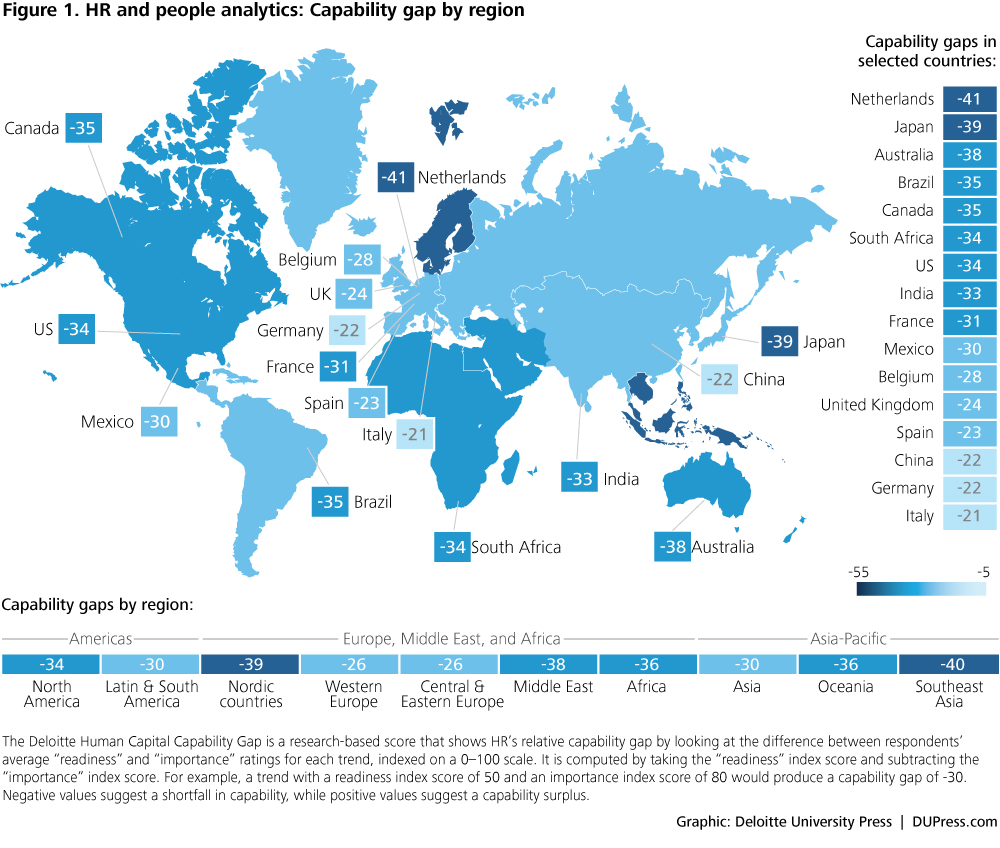How to Overcome the People Analytics Skills Gap
 By Ettie Holland on 19.02.2021
By Ettie Holland on 19.02.2021 The people analytics skills gap is the biggest threat to progress in the sector. HR leaders must get a handle on the changing demands of a data-integrated space, or risk losing pace with competitors.
According to the Deloitte Human Capital Capability Gap, people analytics is one of the things HR is worst at. Aside from being a mouthful, the Gap report offers essential insight into the state of people analytics readiness today. It turns out that we’re not very ready at all.
Some high-profile organisations do people analytics exceptionally well, but the rest of us lag behind. Indeed, the Gap report shows that people analytics is the second-largest capability gap in HR at the moment.

(Source: The Deloitte Human Capital Capability Gap report)
As HR consultant Steven Toft notes, speaking at the Tucana People Analytics Conference back in April, “There’s a lot of aspiration around HR analytics. But HR seems to be stuck in neutral”.
The problem isn’t a lack of enthusiasm. You’ve been living under a rock if you haven’t heard the people analytics hype, and everyone wants a slice of the pie. Like big data before it though, the people analytics sector is plagued by skill shortages.
People analytics is distressingly new. Unlike other HR developments, people analytics hasn’t evolved so much as exploded onto the scene. There are no predecessors to guide us, and few people know what’s expected of them. Add the fact that people analytics insists on blurring the lines between HR and myriad other disciplines, and, well, the problem’s clear.
People analytics takes skills that we don’t have, as HR professionals, because we’ve never had to have them. There’s a cross-discipline diversity called for here that leaves many of us floundering. You know what they say though. The first step to recovery is admitting you have a problem… so here goes.
Let’s look at the talents HR leaders must cultivate to overcome the people analytics skills gap.
The People Analytics Skills Gap
8 Essential Qualities and Skills For Effective People Analytics

#1 - HR Knowledge
This might seem obvious, but it’s an important point. There’s a temptation to build people analytics teams by mining proven talent from other sectors. Many talented analysts have cut their teeth on Big Data, after all. Bringing in external talent should be commended (if you can find and afford it), but it shouldn’t be forgotten that people analytics is the natural domain of HR.
The most critical people analytics skill is native to HR professionals: a deep understanding of HR. As we wrote in our piece on the people analytics methodology, the best results come when you ask the best questions.
Nothing is an adequate substitute for astute people-related questions, and the best people to ask them are the people who live and breathe them. HR professionals’ understanding of workforce dynamics will be essential to effective people analytics.
#2 – Broader Business Acumen
Although HR has a critical role to play, people analytics should never be siloed in HR. As we wrote earlier this month, people analytics is useful when you use it to solve business problems. These questions are fundamentally rooted in HR, but they become powerful when they link back to the broader business. They must address business-significant issues.
An effective people analytics program must answer the Big Questions. How can we reduce turnover and cut the bottom line? How can we improve employee morale to increase productivity and drive further profit? HR leaders must have the broader business awareness to pose the questions that matter, or your people analytics efforts will be futile.
#3 – Gravitas
Gravitas, or “executive presence”, is a strange and unquantifiable thing. It’s also one of the essential people analytics skills. Gravitas is about credibility, and influence, and authority. It’s about trust.
Fundamentally it’s about earning buy-in with other senior decision-makers, so you can unlock resources and support instead of roadblocks and scepticism. Dissent in the ranks can cut your people analytics projects off before you start. Getting everyone to pull in the same direction will be critical: that’s where gravitas becomes essential.
Read More: The 7 Biggest People Analytics Challenges
#4 – Project Management Ability
People analytics can quickly spiral, becoming unfocused and ineffective. There’s just so much data, and many a well-intentioned people analytics team has got lost in the snowstorm. You find yourself throwing resources at a mountain of data that never yields meaningful insight, chasing your own tail.
The best people analytics programmes run a tight ship. The importance of leading a focussed, objective-centric, project team cannot be underestimated.
#5 – Storytelling
Without a story, data is just data. The magic of people analytics happens when you apply the data to solve your problems, which means weaving a meaningful narrative. Make that narrative compelling, and you’re able to drive action – and that’s the true measure of success.
There’s a subtlety here because it’s a difficult skill to master. It’s an ability to see the bigger picture, but that doesn’t quite sum it up. Perhaps the phrase that works best is strategic imagination: an ability to take raw facts and translate them into something else. Something that’s much more captivating. This is one of the most important people analytics skills and the most difficult to teach. It’s a gift.
#6 –Understanding of Statistics & Analysis
This is the bit that puts most HR professionals off because it’s the most obviously out-of-discipline. It plays a massive part in the people analytics skills gap, perhaps because people find the very idea of statistical analysis intimidating. It goes without saying that you can’t do people analytics without the analytics component, however. Collecting data only gives you the jigsaw pieces; analysis is how you put everything together.
Saying that, you don’t need to be a data scientist to leverage people analytics effectively. Calculating averages is a form of analysis, as is cost-per-hire. However, this area can profit from investment if you already have a functioning analytics infrastructure. Finding someone with advanced people analytics skills can help you take your performance to the next level.
#7 – Tact & People Skills
Now more than ever, HR leaders must be able to to manage change effectively. During the turbulent times of innovation, both tact and people skills are demanded in order to manage uncertainty and drive clarity.
HR leaders must be change leaders, able to soothe, spur on or scold as the moment demands. These skills have often been part of the HR remit, to some extent, but they’re becoming more critical than ever. Today’s HR professional is not afforded the luxury of a backseat position.
#8 – Passion
The importance of passion cannot be overstated. People analytics is still young, and many people are still underwhelmed. What’s really called for are people analytics advocates, whose contagious excitement will inspire and compel involvement.
HR leaders must get passionate about people analytics or step aside for someone who is. Legacy attitudes do nothing but damage progress. People analytics is powerful when it moves beyond insight into action. Action demands belief, which is fostered by passion.
Conclusion
Clearly, the skills needed to excel at people analytics are diverse, and while the sector is still immature, investment to hire externally is often limited. Take heart, though, that the power to overcome the people analytics skills gap is in our own hands. An army of data scientists is less important than looking inwards and building our own leadership, change management and organisational abilities. Starting small is better than not starting at all.
Did this help you overcome your people analytics challenges? Was your problem one of the above, or is something else holding you back? To discuss your challenges, click on the button below to schedule a call with a Tazio expert.


